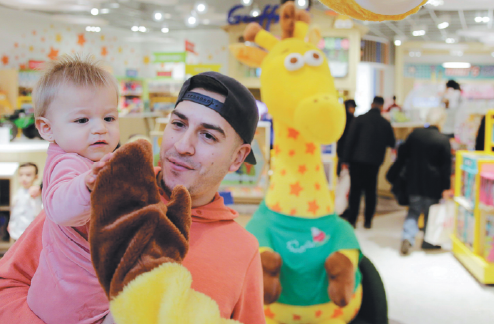BOCA RATON, United States-The US toy industry narrowly escaped potentially disastrous tariff hikes before Christmas, thanks to the "phase-one" economic and trade deal between the United States and China.
Admitting that the deal was a big relief, Jay Foreman, president and chief executive officer of Basic Fun, a Florida-based toy business, said the threat of tariff hikes was akin to a "sword" over his head and had cast a shadow on business operations, planning and development.
"Of course I will feel great that I don't have impending disaster raining down on me," Foreman told Xinhua News Agency in a recent interview. "I would have really felt a lot better if I never had it in the first place."
For months, Foreman and his colleagues had been concerned that the toys his company imports from China would be slapped with additional 15-percent tariffs, previously scheduled to take effect on Dec 15.
"It's a direct tax on our merchandise and profits," Foreman said of the tariffs. "If somebody is trying to take and reduce our profits, it becomes a nightmare."
Facing the threat, Basic Fun, most of whose products are manufactured in China, has closely followed the trade negotiations between the world's top two economies and constantly held meetings to discuss the situation.
"Are the tariffs on? We have a meeting. What do we do? Are the tariffs off? We have a meeting. What do we do? So it really becomes difficult to plan," Foreman said.
The anxiety kept growing until two days before the deadline when China and the United States announced the "phase-one" agreement, followed by the White House's decision not to proceed with the planned tariffs targeting Chinese imports, including phones, computers, holiday ornaments, clothing and toys.
Steve Pasierb, president and chief executive of the New York City-based US Toy Association, said he welcomes the deal.
"With the uncertainty removed, toy companies can move forward and focus on planning, product development and providing joy for kids through the toys and games they make," Pasierb said in a statement.
Foreman said he understands that the deal will not fix all the trade issues between the two nations, but "it's a goodwill gesture to show the market and the world that the US and China can work together."
Since trade friction between the two sides began over a year ago, US businesses relying on China's manufacturing prowess were frequently asked why they did not relocate their production to other countries or regions.
Most said they could not or would not, including Basic Fun, which lists safety as its primary concern. Over the past few decades, Basic Fun and many other US toy companies have worked closely with their Chinese partners. Together they have developed the best supply chain and the highest safety standards in the toy industry.
"It's a really efficient, fantastic and most importantly, safe production and supply chain … It's really important for toys to be made safely," said Foreman. "You hardly ever hear an issue of a toy being unsafe anymore that's made in China."
The entrepreneur also weighed in on China's strength in manufacturing. "We really rely on the Chinese productivity a lot because the factories and the workforce are extremely efficient."
"They really know how to set up production lines," he said. "They are motivated. They are hardworking. They are diligent. And they have been a really important part of the growth of the US toy industry."
As for Basic Fun, moving production out of China would take 12 to 24 months and cost millions of dollars, not to mention posing certain risks.
"I can say that I have no interest in moving out of China … There is no good option for our industry," Foreman said.
The past two years for the US toy industry have been tough. Toys "R" Us, once the country's leading toy retailer and Basic Fun's biggest customer, filed for bankruptcy in 2017, resulting in the closure of hundreds of stores and the elimination of tens of thousands of jobs.
Partly because of Toys "R" Us' downfall, the US toy industry is expected to be hit with a decline of 3 to 5 percent in sales in 2019, Foreman said.
The waning of brick-and-mortar retail in the United States comes amid a rise of online sales and shopping, which has brought both challenges and opportunities for Basic Fun and other toy brands. "All of us in the toy industry are slowly, with many challenges, learning the best way to sell and market our products online," Foreman said.
In addition to competing against each other, US toy makers also face fierce competition from console games, mobile gaming and social media. Clearly, no one wants more tariffs or the threat of them.
"We work in a business that has a long development cycle. We are selling and we are showing our customers products now for next Christmas," he said. "When there is uncertainty about the price you are going to charge your customers, you really can't plan effectively."
But the US toy industry might consider itself lucky, given how plenty of imports from China still remain subject to extra tariffs by Washington, which are taking a toll on the national economy, company profits and the public.
Pasierb said he wants to see an end to the trade friction, urging the administration to "seize this opportune point in time to also eliminate tariffs that remain in effect".
Xinhua

